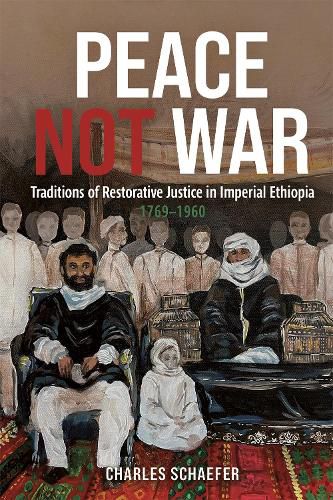Readings Newsletter
Become a Readings Member to make your shopping experience even easier.
Sign in or sign up for free!
You’re not far away from qualifying for FREE standard shipping within Australia
You’ve qualified for FREE standard shipping within Australia
The cart is loading…






Examines one of the few documented early examples of restorative justice from Africa or Latin America.
With a writing system, Ethiopian emperors as well as pretenders to the throne chronicled their exploits including peace-building feats, and this book showcases and analyses historically verified instances, from as early as 1769, where restorative justice modalities were used to resolve conflict and bring peace to the country.
Peace not War traces Ethiopia's evolving understanding of restorative justice from the 'forgive and forget' approach which characterized the Zemene Mesafint (Era of the Princes), where perpetrators were exonerated, allowing them to recoup and build their armies to fight another day, to conditional forgiveness, recorded by the imperial court and dependent on atonement. Ethiopia's long history of experimentation with different forms of restorative justice demonstrates ingenuity, flexibility, and adaptability, but as the twentieth century progressed, workable, indigenous forms of restorative justice were sidelined by Western codified law that emphasized retribution.
$9.00 standard shipping within Australia
FREE standard shipping within Australia for orders over $100.00
Express & International shipping calculated at checkout
Examines one of the few documented early examples of restorative justice from Africa or Latin America.
With a writing system, Ethiopian emperors as well as pretenders to the throne chronicled their exploits including peace-building feats, and this book showcases and analyses historically verified instances, from as early as 1769, where restorative justice modalities were used to resolve conflict and bring peace to the country.
Peace not War traces Ethiopia's evolving understanding of restorative justice from the 'forgive and forget' approach which characterized the Zemene Mesafint (Era of the Princes), where perpetrators were exonerated, allowing them to recoup and build their armies to fight another day, to conditional forgiveness, recorded by the imperial court and dependent on atonement. Ethiopia's long history of experimentation with different forms of restorative justice demonstrates ingenuity, flexibility, and adaptability, but as the twentieth century progressed, workable, indigenous forms of restorative justice were sidelined by Western codified law that emphasized retribution.